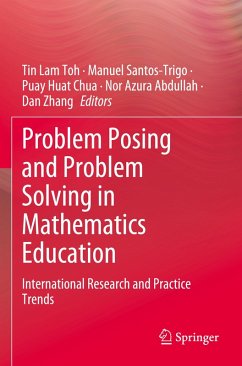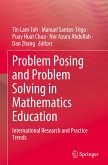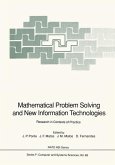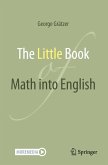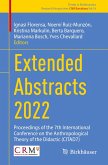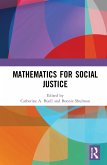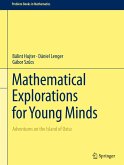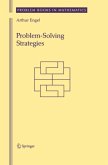Problem Posing and Problem Solving in Mathematics Education
International Research and Practice Trends
Herausgegeben:Toh, Tin Lam; Santos-Trigo, Manuel; Chua, Puay Huat; Abdullah, Nor Azura; Zhang, Dan
Problem Posing and Problem Solving in Mathematics Education
International Research and Practice Trends
Herausgegeben:Toh, Tin Lam; Santos-Trigo, Manuel; Chua, Puay Huat; Abdullah, Nor Azura; Zhang, Dan
- Broschiertes Buch
- Merkliste
- Auf die Merkliste
- Bewerten Bewerten
- Teilen
- Produkt teilen
- Produkterinnerung
- Produkterinnerung
This book presents both theoretical and empirical contributions from a global perspective on problem solving and posing (PS/PP) and their application, in relation to the teaching and learning of mathematics in schools. The chapters are derived from selected presentations in the PS/PP Topical Study Group in ICME14. Although mathematical problem posing is a much younger field of inquiry in mathematics education, this topic has grown rapidly. The mathematics curriculum frameworks in many parts of the world have incorporated problem posing as an instructional focus, building on problem solving as…mehr
Andere Kunden interessierten sich auch für
![Problem Posing and Problem Solving in Mathematics Education Problem Posing and Problem Solving in Mathematics Education]() Problem Posing and Problem Solving in Mathematics Education82,99 €
Problem Posing and Problem Solving in Mathematics Education82,99 €![Mathematical Problem Solving and New Information Technologies Mathematical Problem Solving and New Information Technologies]() PonteMathematical Problem Solving and New Information Technologies161,99 €
PonteMathematical Problem Solving and New Information Technologies161,99 €![The Little Book of Math into English The Little Book of Math into English]() George GrätzerThe Little Book of Math into English25,99 €
George GrätzerThe Little Book of Math into English25,99 €![Extended Abstracts 2022 Extended Abstracts 2022]() Extended Abstracts 2022178,99 €
Extended Abstracts 2022178,99 €![Mathematics for Social Justice Mathematics for Social Justice]() Mathematics for Social Justice197,99 €
Mathematics for Social Justice197,99 €![Mathematical Explorations for Young Minds Mathematical Explorations for Young Minds]() Bálint HujterMathematical Explorations for Young Minds49,99 €
Bálint HujterMathematical Explorations for Young Minds49,99 €![Problem-Solving Strategies Problem-Solving Strategies]() Arthur EngelProblem-Solving Strategies95,99 €
Arthur EngelProblem-Solving Strategies95,99 €-
-
-
This book presents both theoretical and empirical contributions from a global perspective on problem solving and posing (PS/PP) and their application, in relation to the teaching and learning of mathematics in schools. The chapters are derived from selected presentations in the PS/PP Topical Study Group in ICME14. Although mathematical problem posing is a much younger field of inquiry in mathematics education, this topic has grown rapidly. The mathematics curriculum frameworks in many parts of the world have incorporated problem posing as an instructional focus, building on problem solving as its foundation. The juxtaposition of problem solving and problem posing in mathematics presented in this book addresses the needs of the mathematics education research and practice communities at the present day. In particular, this book aims to address the three key points: to present an overview of research and development regarding students' mathematical problem solving and posing; todiscuss new trends and developments in research and practice on these topics; and to provide insight into the future trends of mathematical problem solving and posing.
Produktdetails
- Produktdetails
- Verlag: Springer / Springer Nature Singapore / Springer, Berlin
- Artikelnr. des Verlages: 978-981-99-7207-4
- Seitenzahl: 272
- Erscheinungstermin: 3. Januar 2025
- Englisch
- Abmessung: 235mm x 155mm x 15mm
- Gewicht: 417g
- ISBN-13: 9789819972074
- ISBN-10: 9819972078
- Artikelnr.: 72728452
- Herstellerkennzeichnung Die Herstellerinformationen sind derzeit nicht verfügbar.
- Verlag: Springer / Springer Nature Singapore / Springer, Berlin
- Artikelnr. des Verlages: 978-981-99-7207-4
- Seitenzahl: 272
- Erscheinungstermin: 3. Januar 2025
- Englisch
- Abmessung: 235mm x 155mm x 15mm
- Gewicht: 417g
- ISBN-13: 9789819972074
- ISBN-10: 9819972078
- Artikelnr.: 72728452
- Herstellerkennzeichnung Die Herstellerinformationen sind derzeit nicht verfügbar.
Dr. Toh Tin Lam is Associate Professor at the National Institute of Education (NIE), Nanyang Technological University (NTU), Singapore, and obtained his Ph.D. from the National University of Singapore (NUS) in Mathematics. He is currently Head of the Mathematics and Mathematics Education Academic Group of the Institute. His involvement as Teacher Educator sparked an interest to develop a second wing of research in mathematics education over the years. He has published extensively in international refereed journals in both mathematics and mathematics education. His research interest in mathematics education involves mathematical problem solving, mathematics teacher professional development, and school mathematics curriculum. He has led two large-scale mathematics education research projects on mathematical problem solving and continues to publish papers on this subject. Manuel Santos-Trigo is Professor at the Mathematics Education Department, Centre for Research and Advanced Studies, Cinvestav-IPN, Mexico. He is Member of the Mexican Academy of Sciences and of the National Researchers System. He teaches graduate courses and does research in mathematical problem solving. His area of interest involves analyzing and documenting teachers and students' systematic and coordinated use of digital technologies in problem-solving activities. He completed his B.Sc. in mathematics at the National Polytechnic Institute in Mexico and a doctorate in mathematics education at the University of British Columbia, Canada. He did a post-doctorate research as Visiting Scholar at the University of California, Berkeley. He has been Visiting Professor at several institutions including Purdue University, l'université d'Orléans (France), and la Universidad de la Laguna (Spain). He has also been Principal Investigator of several research projects in the field of problem solving and the use of technology with national and international funding. He was Co-chair of the Topic Study Group on Mathematical Problem Solving of the 13th International Congress on Mathematical Education and has supervised doctoral and master's students in mathematics education in México and abroad. Dr. Puay Huat Chua is Senior Teaching Fellow with the Office of Education Research (OER) at the National Institute of Education (NIE), Nanyang Technological University (NTU), Singapore. He works actively on conceptualizing and operationalizing knowledge mobilization and also on collaboration work on data mining applications within education. He received his Doctor of Philosophy from the Nanyang Technological University (NTU) in mathematics education. He was a Senior Research Analyst with Research Evaluation in the Planning Division in the Ministry of Education (MOE), was involved in work on international comparative studies, and was also Vice Principal of three secondary schools. His main interest is in mathematics problem solving and posing. Besides conducting data literacy workshops, he also teaches mathematics pedagogical courses. His current interest is in enhancing school improvement through teacher data literacy and in examining knowledge translation, brokerage, and educational partnership. Dr. Nor Azura Abdullah started as Tutor at the Sultan Hassanal Bolkiah Institute of Education (SHBIE) back in 2006. After obtaining her master's degree in 2007, she was appointed Lecturer in the university and went on to pursue her graduate studies in Japan and Hong Kong, in 2011 and 2015, respectively. In SHBIE, she continues to teach mathematics education modules for teacher education, at both primary and secondary levels. Her initial research interest started from teachers' pedagogical knowledge and development and has since expanded into teachers' values in the teaching and learning of mathematics and professional development of teachers, such as in lesson study. Zhang Dan, a professor of Beijing Academy of Educational Sciences, China, was a core member of the research team for the National Compulsory Education Mathematics Curriculum Standard 'Experimental Edition', and the National Compulsory Education Mathematics Curriculum Standard (2011 Edition). She is the vice chairman of the Primary School Mathematics Teaching Professional Committee of the Chinese Society of Education. Her research interests include problem posing and solving, 'problem leading learning' and primary school mathematics teaching.
Problem posing and problem-solving developments: Issues and themes within and from ICME 14 Topical Study Group contributions.- Trends and developments of mathematical problem-solving research to update and support the use of digital technologies in post-confinement learning spaces.- Problem posing and modeling: Confronting the dilemma of rigor or relevance.- Types of mathematical reasoning promoted in the context of problem-solving instruction in Geneva.- Prospective secondary school mathematics teachers' use of digital technologies to represent, explore and solve problems.- Primary school teachers' behaviors, beliefs, and their interplay in teaching for problem-solving.- Movie clips in the enactment of problem solving in the mathematics classroom within the framework of communication model.- On teaching of word problems in the context of early algebra.- Problem posing by mathematics teachers: The problems they pose and the challenges they face in the classroom.- Problem posing among preservice and inservice mathematics teachers.- An approach to developing the problem-posing skills of prospective mathematics teachers: Focus on the "what if not" heuristics.- Regulation of cognition during problem posing : A case study.- Problem posing in Pósa problem threads.- Conclusion: Mathematics problem posing and problem solving: Some reflection on recent advances and new opportunities.
Problem posing and problem-solving developments: Issues and themes within and from ICME 14 Topical Study Group contributions.- Trends and developments of mathematical problem-solving research to update and support the use of digital technologies in post-confinement learning spaces.- Problem posing and modeling: Confronting the dilemma of rigor or relevance.- Types of mathematical reasoning promoted in the context of problem-solving instruction in Geneva.- Prospective secondary school mathematics teachers' use of digital technologies to represent, explore and solve problems.- Primary school teachers' behaviors, beliefs, and their interplay in teaching for problem-solving.- Movie clips in the enactment of problem solving in the mathematics classroom within the framework of communication model.- On teaching of word problems in the context of early algebra.- Problem posing by mathematics teachers: The problems they pose and the challenges they face in the classroom.- Problem posing among preservice and inservice mathematics teachers.- An approach to developing the problem-posing skills of prospective mathematics teachers: Focus on the "what if not" heuristics.- Regulation of cognition during problem posing : A case study.- Problem posing in Pósa problem threads.- Conclusion: Mathematics problem posing and problem solving: Some reflection on recent advances and new opportunities.

